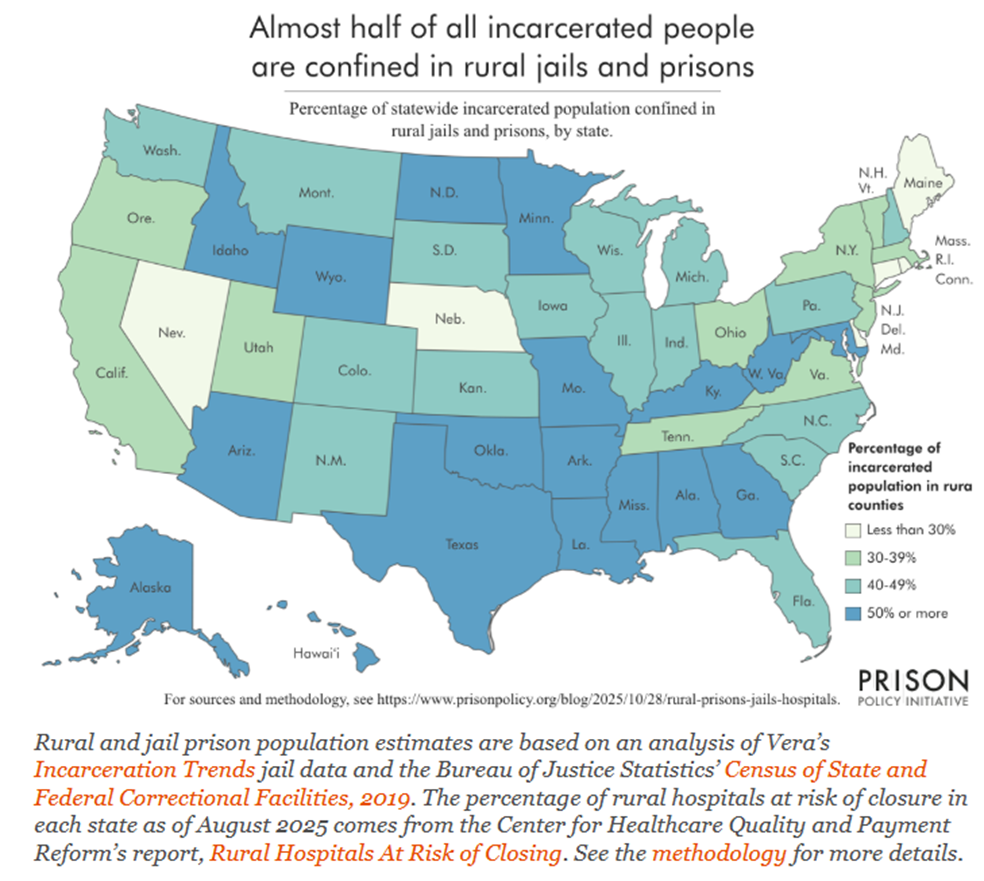Nearly 1M Are Incarcerated In Rural America: 60% in Prisons and 25% in Local Jails – Soon Without Medical Care
Nearly half of all incarcerated individuals are held in rural jails and prisons, which puts them at risk of losing access to hospitals.
The Trump administration’s “One Big Beautiful Bill Act” is expected to lead to the closure of many rural hospitals. This will leave surrounding communities, including those in prisons and jails, facing higher healthcare costs and limited access to essential medical care. PPI, by Emily Widra, October 28, 2025
Nearly half of all incarcerated individuals are housed in rural jails and prisons, jeopardizing their access to essential healthcare. The Trump administration’s “One Big Beautiful Bill Act” threatens to close many rural hospitals, exacerbating the crisis.
Recent Medicaid cuts by Congress are forcing these hospitals to reduce operations or shut down completely, leaving both incarcerated individuals and rural residents without timely emergency care and facing skyrocketing healthcare costs. This loss of medical services will increase poverty, unemployment, and disability rates, perpetuating a dangerous cycle that often leads to more incarceration. We cannot ignore the devastating impact of these policies on vulnerable communities.
Incarceration severely impacts the health of people behind bars, often shortening their life expectancies . This concern is heightened by the increasing number of elderly and chronically ill inmates. Researchers warn that closing rural hospitals can lead to worse outcomes for urgent medical conditions, such as high-risk deliveries, trauma, and heart conditions., which are particularly prevalent in the incarcerated population. For instance, around 2% of women entering jail are pregnant , and many of these births are high-risk.
Heart disease is now the second leading cause of death behind bars—a tragic reflection of how broken prison healthcare has become. Many people in jails and prisons can’t get even basic medical care, and too many die waiting for it.
Medicaid cuts will make this crisis far worse. More than 783,000 people are incarcerated in rural counties, and over five million are arrested each year, many in communities where hospitals are already closing. When those hospitals shut down, it’s not just the incarcerated who suffer—entire towns lose access to lifesaving care.
Rural jails already have the highest death rates in the nation, and most people behind bars will return home sicker than when they entered. These cuts will deepen poverty, worsen public health, and turn small-town jails into warehouses for the poor and ill.
This isn’t just bad policy—it’s a moral failure. Choosing to cut Medicaid means choosing punishment over care, and abandoning some of the most vulnerable people in America.


